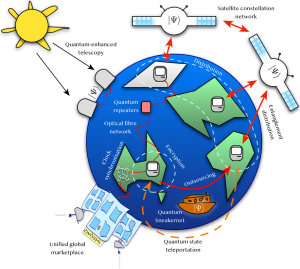

The true power of classical computing was never fully realised until the emergence of the internet, enabling the global integration of computing infrastructure. Indeed, many of our present-day devices would have very little utility without it. In the absence of the internet, consumers would not be able to rely on cloud infrastructure, information sharing and communication would not be possible, supercomputing would be largely inaccessible, and smartphones would be little more than bricks. The internet enables information to be a commodity whose market value drives technological advancement.
With emerging quantum technologies the quantum internet will be very different and far more powerful. Quantum computers operate according to entirely different principles in the way they process information, which in the future will enable many advanced and extremely economically valuable forms of computation to be implemented which cannot be realised on conventional computers. This raises the immediate question “what if we start networking them together?”
The classical internet is not capable of integrating remote quantum devices. This requires entirely new infrastructure that distributes quantum entanglement, a uniquely quantum information resource. The long-term vision for this infrastructure is the quantum internet, something that will likely develop in the coming decades. As with the emergence of the classical internet, it is to be expected that quantum computers will not realise their full potential until this infrastructure exists. But the motivation is even stronger than for classical devices. When classical computers are unified via distributed cloud-based architectures, the net computational power is effectively the sum of the parts. However, quantum computers exhibit fundamentally different scaling characteristics: a classical computer’s power is roughly proportionate to the number of CPUs it contains, whereas a quantum computer’s power grows exponentially with the number of quantum bits —or qubits— it processes. Therefore, upon unifying quantum devices via a quantum internet, we are left with something far greater than the sum of the parts, acting as an immediate incentive for global cooperation.
This quantum enhancement in computing power translates to enhanced economic incentives and returns, making quantum entanglement a highly valuable future commodity. As with any fungible commodity, entanglement will have a market value that drives economic investment into the infrastructure required to distribute it. In an ideal world, a unified global marketplace would emerge, similar to what we see in other global markets. The strategic implications of quantum computing are immense — breaking important cryptographic codes, making new unbreakable ones, with major implications for research & development, important optimisation problems, drug design and simulation. However, these strategic implications may also fracture quantum networks along geo-strategic boundaries, leading to quantum alliances, diplomacy and politics.
Although it is too early to predict exactly how the quantum internet will evolve over the coming decades, its clear this technology will underpin the future quantum era in the same way that the classical internet underpins the present digital era. One thing is certain — the global impact of the quantum internet will be enormous.
Title: The Quantum Internet: The Second Quantum Revolution
Author: Peter P. Rohde,
ISBN: 9781108491457
Latest Comments
Have your say!